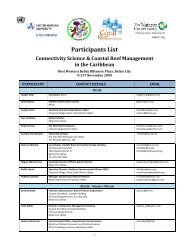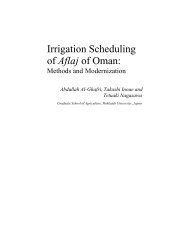The Global Water Crisis: Addressing an Urgent Security - Unu-inweh ...
The Global Water Crisis: Addressing an Urgent Security - Unu-inweh ...
The Global Water Crisis: Addressing an Urgent Security - Unu-inweh ...
Create successful ePaper yourself
Turn your PDF publications into a flip-book with our unique Google optimized e-Paper software.
Introduction<br />
“Our future looks promising but the way there is devious.”<br />
- Chinese proverb<br />
<strong>The</strong> global debate on climate ch<strong>an</strong>ge has taken on increasingly sharp concern over water security at all levels. M<strong>an</strong>y<br />
definitions of water security are currently in use. <strong>The</strong> following definition from UNEP (2009: 47) will be used as a base for<br />
this paper: “<strong>Water</strong> security represents a unifying element supplying hum<strong>an</strong>ity with drinking water, hygiene <strong>an</strong>d s<strong>an</strong>itation,<br />
food <strong>an</strong>d fish, industrial resources, energy, tr<strong>an</strong>sportation <strong>an</strong>d natural amenities, all dependent upon maintaining ecosystem<br />
health <strong>an</strong>d productivity.”<br />
Within this definition, both ecosystems <strong>an</strong>d social well-being are held as being equally essential, <strong>an</strong>d hum<strong>an</strong>ity implies<br />
the inclusion of both men <strong>an</strong>d women. As such, <strong>an</strong>d as with m<strong>an</strong>y other similar statements, it implicitly carries within it<br />
gender neutrality. However, the reality in the water sector is that often it is not gender neutral at all; <strong>an</strong>d <strong>an</strong>y attempt to<br />
enh<strong>an</strong>ce water security needs to be viewed within a gendered perspective, which calls for the study <strong>an</strong>d incorporation<br />
of the differential access of women <strong>an</strong>d men to water resources for productive <strong>an</strong>d domestic use.<br />
In recent decades, the accept<strong>an</strong>ce of participatory water m<strong>an</strong>agement methodologies <strong>an</strong>d the greater accept<strong>an</strong>ce of<br />
much needed reforms, especially in the water <strong>an</strong>d s<strong>an</strong>itation sector, have led to attempts to ensure greater involvement<br />
of stakeholders, specifically women. This paper draws from experiences of field-based advocacy by civil society <strong>an</strong>d<br />
observations of water sector initiatives mainly in Sri L<strong>an</strong>ka.<br />
1. International Recognition for Women in the <strong>Water</strong> Sector<br />
<strong>The</strong> dialogue emphasizing the centrality of women to water resources m<strong>an</strong>agement <strong>an</strong>d water security was initiated in the<br />
International Decade for Cle<strong>an</strong> Drinking <strong>Water</strong> (1981-1990), intensified by the global accept<strong>an</strong>ce of the four Dublin Principles<br />
presented at the 1992 Rio Earth Summit (<strong>Global</strong> <strong>Water</strong> Partnership, 2012), <strong>an</strong>d further extended by the establishment<br />
of the International <strong>Water</strong> for Life Decade (2005-2015) through a resolution adopted by the United Nations General<br />
Assembly (UNGA, 2004). <strong>The</strong> central role played by women in the water sector has been enunciated at m<strong>an</strong>y international<br />
fora, such as the Stockholm <strong>Water</strong> Symposium, <strong>an</strong>d has been the focus of m<strong>an</strong>y international deliberations. Numerous<br />
attempts have been made to address gendered issues <strong>an</strong>d engage development through a gendered perspective. M<strong>an</strong>y<br />
achievements have especially been made in accepting <strong>an</strong>d promoting the role of women in the water supply sector, but<br />
the same level of success c<strong>an</strong>not be claimed for the irrigation <strong>an</strong>d irrigated agriculture sector. <strong>The</strong> United Nations Hum<strong>an</strong><br />
Rights Council’s affirmation in 2010 of the right to water <strong>an</strong>d s<strong>an</strong>itation as hum<strong>an</strong> rights has further assured water security<br />
in a legislative sense (UN Hum<strong>an</strong> Rights Council, 2010), but is in itself insufficient to ensure a gendered perspective. <strong>The</strong><br />
women <strong>an</strong>d water dialogue will continue at the upcoming Rio +20 event in June 2012, at which a Women’s Vision for<br />
Sustainable Development will be presented by the Women’s Major Group 1 , highlighting once more the need for greater<br />
consensus <strong>an</strong>d concerted action.<br />
2. <strong>Water</strong> <strong>an</strong>d Women in Sri L<strong>an</strong>ka<br />
In the 21 st century, Asia is expected to face extreme negative impacts from climate ch<strong>an</strong>ge, including: decreased freshwater<br />
availability; loss of l<strong>an</strong>dscape <strong>an</strong>d natural resources; a subst<strong>an</strong>tial reduction in crop yields from rain-fed agriculture, directly<br />
affecting food security; all of which come with result<strong>an</strong>t increasing malnutrition <strong>an</strong>d related diseases. As primary caregivers<br />
in the domestic context <strong>an</strong>d major contributors to a predomin<strong>an</strong>tly agricultural Asi<strong>an</strong> society, it has therefore become<br />
increasingly necessary to review <strong>an</strong>d identify ways of ensuring <strong>an</strong>d optimizing the effective participation of women in<br />
water- <strong>an</strong>d climate-related activities.<br />
<strong>Water</strong> <strong>an</strong>d women’s work is synonymous in most parts of Asia. <strong>The</strong> traditional gendered division of labour in the domestic<br />
<strong>an</strong>d the productive sectors has in some inst<strong>an</strong>ces given way to new developments due to factors such as the feminization<br />
1 <strong>The</strong> core org<strong>an</strong>isers of the Women’s Major Group for Rio + 20 currently consists of the following: Voices of Africa Women (VAF), Women in Europe<br />
for a Common Future (WECF), Women’s Environment <strong>an</strong>d Development Org<strong>an</strong>ization (WEDO) <strong>an</strong>d ENERGIA International Network on Gender <strong>an</strong>d<br />
Sustainable Energy. See: http://www.womenrio20.org/index.html.<br />
Investing in Women’s Participation for Enh<strong>an</strong>ced <strong>Water</strong> <strong>Security</strong>: A Practitioner’s View from Sri L<strong>an</strong>ka<br />
Part 2<br />
101




